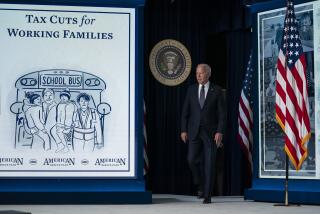Panel Balks at Aiding Farm Credit System, Removes $3 Billion From Bill
- Share via
WASHINGTON — House Agriculture Committee leaders backpedaled Thursday on giving federal aid to the troubled Farm Credit System, removing $3 billion from proposed legislation in the face of continued Reagan Administration opposition.
The bill introduced by four key committee leaders still provides a mechanism for backstop financial assistance to the huge network of farm banks but it no longer specifies an amount. Thus, the legislation now emphasizes two conditions for aid demanded by the Administration:
--Broader authority for the Farm Credit System to shift its own substantial reserves from financially sound banks to troubled ones.
--Increased powers for the system’s federal regulatory agency, the Farm Credit Administration.
‘Considerable Uncertainty’
The change in the bill’s financial aid provision was described by a committee aide as a concession to the Administration designed to assure passage of the measure before Congress adjourns for the year.
“There was such a considerable degree of uncertainty about what the system’s actual needs may turn out to be that it was considered better not to specify a dollar figure,” said the aide, who refused to be identified.
He added: “This comes closer to meeting what the Administration wants and it should help the bill move faster.”
The legislation is sponsored by committee Chairman E. (Kika) de la Garza (D-Tex.); Rep. Edward R. Madigan of Illinois, the panel’s ranking Republican; Rep. Ed Jones (D-Tenn.), chairman of the subcommittee on conservation, credit and rural development, and Rep. E. Thomas Coleman of Missouri, the subcommittee’s top Republican.
Opposition to Bail-Out
At a subcommittee hearing Wednesday, officials from the Treasury and Agriculture departments reiterated the Administration’s opposition to a financial bail-out, at least for now.
The Farm Credit System, which holds a third of the nation’s $212 billion in farm loans, “does not now need the government’s financial support in any fashion,” Assistant Treasury Secretary Charles O. Sethness testified.
The system of 37 cooperatively owned banks and more than 700 lending outlets “has a capital base that would be the envy of other financial institutions,” Sethness said. He noted that the system as a whole has a surplus of $5.5 billion, loan loss reserves of $1.6 billion and member stock totaling $5.3 billion.
That should be plenty for the system to fall back on, he said, even if it suffers the $3 billion to $5.5 billion in losses it is estimating for the next two years.
However, Sethness added, the Administration will reassess the system’s need for aid if Congress approves the self-help and regulatory reforms in the committee leaders’ bill.
More to Read
Get the L.A. Times Politics newsletter
Deeply reported insights into legislation, politics and policy from Sacramento, Washington and beyond. In your inbox twice per week.
You may occasionally receive promotional content from the Los Angeles Times.









